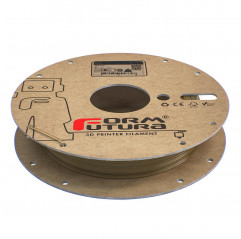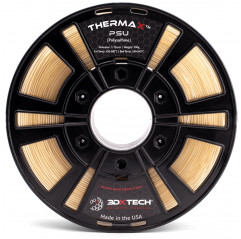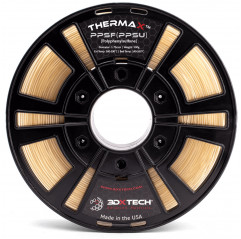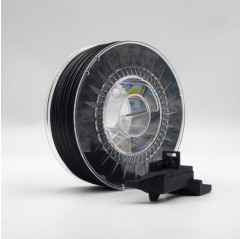Worldwide express shipping
Worldwide express shipping
PPSF & PSU - Polyphenylsulfone

PPSU / PPSF filament
Polyphenylsulfone (PPSU or PPSF) is a high performance amorphous thermoplastic. It is one of the strongest FDM printer materials. It features excellent mechanical properties complemented by thermal and chemical resistance, making it suitable for the most demanding applications where higher workloads and chemical exposure prevail. The PPSU is characterized by robustness, heat resistance and sterilisability.
Characteristics of Polyphenylsulfone (PPSF / PPSU) include:
- Resistance to shocks, chemicals and hydrolysis,
- Flame retardant of UL94V0 standard with low smoke evolution and low smoke toxicity,
- Good temperature resistance: Tg of 220°C and HDT of 205°C,
- High resistance to environmental stress (ESCR),
- Resistance to gamma radiation - even in large doses (10 Billion),
- Sterilization capabilities - including EtO gas, radiation, steam autoclave sterilization, plasma, dry heat and cold sterilization,
- Resistance to liquids such as petrol, antifreeze, transmission fluid, engine oil, washer fluid
- Excellent dimensional stability (low sensitivity to creep and low coefficient of thermal expansion).
Applications of PPSU / PPSF filament
Polyphenylsulfone (PPSU) is a high-performance amorphous thermoplastic that offers excellent impact resistance and chemical resistance.
The PPSU has a good yield up to temperatures of 180°C. Being also resistant to hydrolysis and common acids, there are several applications of this filament for 3D printing.
The PPSF filament finds application in the following fields: aerospace, aeronautical, automotive, drones, home automation, robotics, biomechanics, dental, medical, surgical instruments.
The PPSU filament is based on Solvay RADEL 5500 technology.
PPSU / PPSF filament printing
For printing polyphenylsulfone filament (PPSU / PPSF thread), it is recommended to set the 3D printer at an extrusion temperature between 360 and 400°C, a printing speed between 15 and 30 mm / s, as well as a plate temperature heating of 140°C.
The PPSU filament is therefore a material suitable for expert users, and above all compatible only with certain types of printers. In fact, an FDM printer is needed that can reach high extrusion temperatures, which has a heating surface and a hot chamber in which the temperature can be controlled.
There are 4 products.















